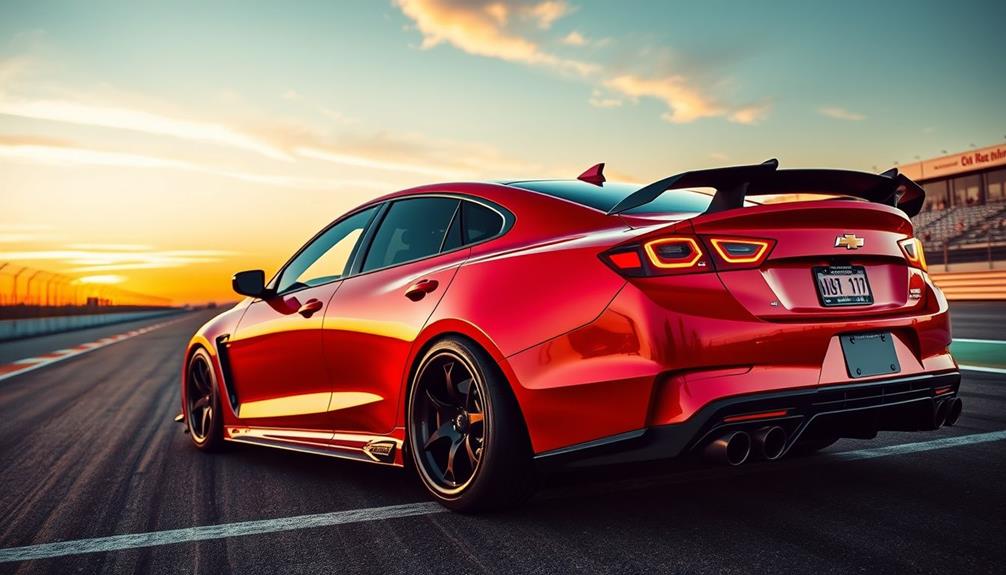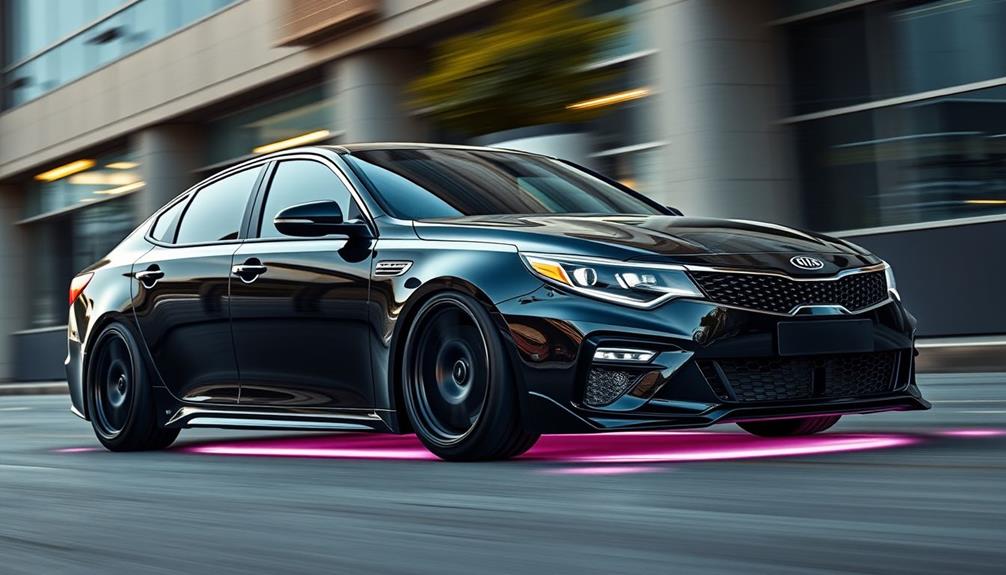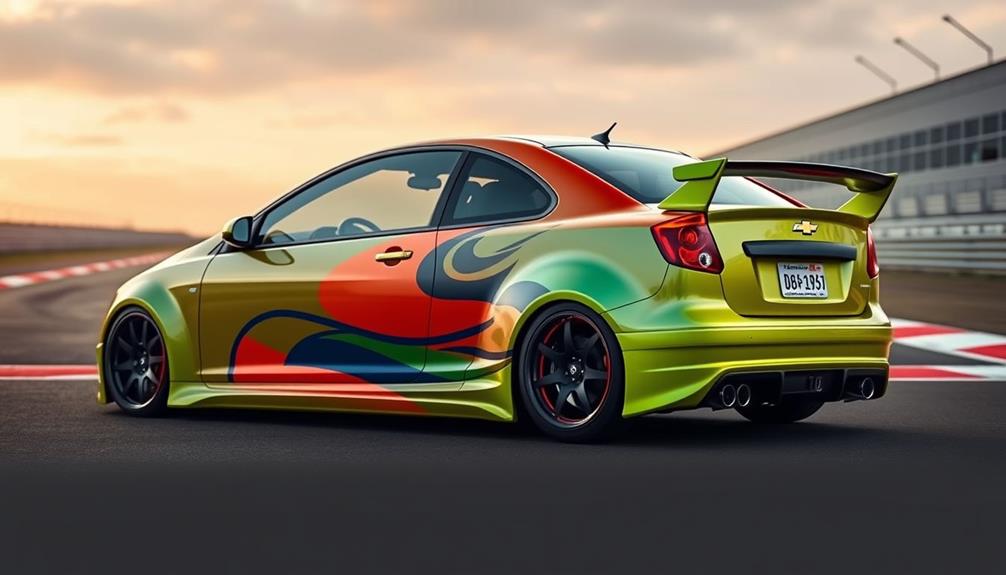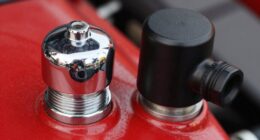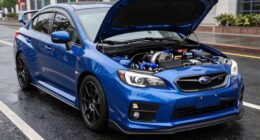You can turn your Chevrolet Malibu into a performance machine by focusing on key upgrades. Start with chip tuning, which boosts horsepower and torque while improving fuel efficiency. Next, consider intake upgrades for added power and enhanced throttle response. While exhaust modifications might not provide considerable performance gains, they can enhance engine sound. Don't forget suspension tuning; high-quality coilovers improve handling and driving dynamics greatly. Finally, engage with fellow enthusiasts to learn from their experiences and insights. Explore these options, and you'll discover more about how to maximize your Malibu's performance potential.
Key Takeaways
- Chip Tuning: Install a performance chip module to enhance horsepower, torque, and fuel efficiency while transforming your driving experience.
- Intake Upgrades: Upgrade the intake system for a potential 5-10% increase in horsepower and improved throttle response.
- Exhaust Modifications: Consider exhaust modifications for improved engine sound, but be aware they may offer minimal performance gains.
- Suspension Tuning: Invest in high-quality coilover systems to enhance handling, cornering, and overall driving dynamics of your Malibu.
- Community Engagement: Join automotive forums to connect with enthusiasts for support, insights, and shared experiences on tuning your Chevrolet Malibu.
Performance Modification Options
Tuning your Chevrolet Malibu opens up a world of performance modification options that can greatly enhance your driving experience.
One of the most effective ways to boost engine performance is through chip tuning. A performance chip module, like the Stage 1 Module priced at $99.99, can considerably increase horsepower and torque while improving fuel economy.
You might also consider intake upgrades, such as the 2016-2023 Malibu Intake, which can yield a 5-10% increase in horsepower and torque, typically costing between $114.95 and $159.95.
While performance exhaust modifications primarily enhance engine noise, they may not provide substantial performance improvements; it's vital to choose the right upgrades for your goals.
Don't overlook suspension tuning, as it's essential for improving handling and cornering. High-quality coilover systems allow you to adjust ride height and damping characteristics, giving you control over your driving dynamics.
These upgrades collectively transform your Chevrolet Malibu into a more capable performance machine, making every drive a thrilling experience.
Engine Swap Considerations

When you're considering an engine swap for your Chevrolet Malibu, you'll need to think about the costs, which can range from $5,000 to $10,000.
Compatibility issues may arise, especially with the PCM and transmission, requiring you to guarantee everything communicates properly.
Plus, you'll need some technical expertise to tackle the complexities involved in the integration process.
Cost Implications of Swaps
Engine swaps for the Chevrolet Malibu can frequently lead to a significant financial commitment, often ranging from $5,000 to $10,000. This cost includes a compatible PCM, engine, and transmission from a modern donor car.
The cost implications of such upgrades can be intimidating, especially for a family sedan where practicality is key. Achieving performance enhancement typically requires extensive modifications, which can add to the overall expense. Labor costs can escalate if you need professional help due to the technical expertise required for a successful swap.
It's crucial to reflect on these financial implications carefully, as they may lead to skepticism about the feasibility of engine swaps among enthusiasts. While the idea of transforming your Malibu into a performance machine is exciting, it's important to evaluate whether the potential benefits outweigh the costs.
You'll want to verify that your upgrades align with your budget and skill level. Before diving in, assess what you're willing to invest and how it impacts your overall project. This way, you can make informed decisions that enhance your Chevrolet Malibu without breaking the bank.
Compatibility and Communication Issues
Swapping the engine in your Chevrolet Malibu can quickly turn into a puzzle, particularly when it comes to compatibility and communication between the new components and your car's existing systems.
You'll need a compatible Powertrain Control Module (PCM), engine, and transmission from a modern donor car to guarantee proper integration. Without this, you might face significant compatibility issues that hinder your performance enhancement goals.
Effective communication between the new engine and the Malibu's systems is vital. Many modern vehicles aren't designed for extensive upgrades, making these swaps complicated. This often requires extensive modifications that can escalate costs, with the estimated total ranging from $5,000 to $10,000.
Moreover, financial implications can be intimidating. You must weigh whether the performance gains justify the investment. Skepticism within the automotive community about the practicality of engine swaps for family sedans like the Malibu stems largely from these challenges.
It's important to reflect on the technical expertise needed to navigate these issues, as they can make or break your engine swap project. Ultimately, careful planning and research are vital to guarantee a successful upgrade.
Technical Expertise Requirements
Steering an engine swap for your Chevrolet Malibu demands a solid foundation of technical expertise. You'll need to select a compatible PCM, engine, and transmission from a modern donor car, which can complicate the process considerably. Planning is important, especially since costs can range from $5,000 to $10,000.
Proper communication with new engine components poses a challenge. Modern vehicles aren't designed for extensive upgrades without considerable modifications. As you commence on this journey, consider the following table to assess your needs:
| Key Areas | Considerations |
|---|---|
| Wiring | Understanding wiring harnesses is essential. |
| Programming | Familiarize yourself with software adjustments. |
| Performance Enhancement | Set realistic performance expectations. |
| Modifications | Plan for necessary structural changes. |
Technical expertise in tuning, wiring, and programming is critical for a successful engine swap. Community discussions often reveal skepticism about practicality in family sedans like the Malibu. As a result, thorough planning and realistic performance expectations are important to avoid disappointment and guarantee a rewarding project.
Tuning Chips and Modules

Releasing your Chevrolet Malibu's full potential can transform your driving experience, and tuning chips and modules are key to achieving that enhancement.
These performance chips reveal hidden engine potential, boosting horsepower and torque for a more thrilling ride. Here are some benefits you can expect from tuning chips and modules:
- Improved Horsepower and Torque: Modules like the Stage 1 enhance performance for just $99.99.
- Fuel Efficiency: Experience up to 15% improvement in fuel economy, maximizing your miles per gallon while maintaining engine safety.
- Plug-and-Play Installation: The Stage 3 Module, priced at $239.95, features a hassle-free installation with an upgraded multi-core CPU for effective performance enhancement.
- Customizable Tuning Stages: Use the RaceChip app to choose from Efficiency, Sport, or Race modes, allowing you to fine-tune your driving experience.
Intake and Exhaust Upgrades
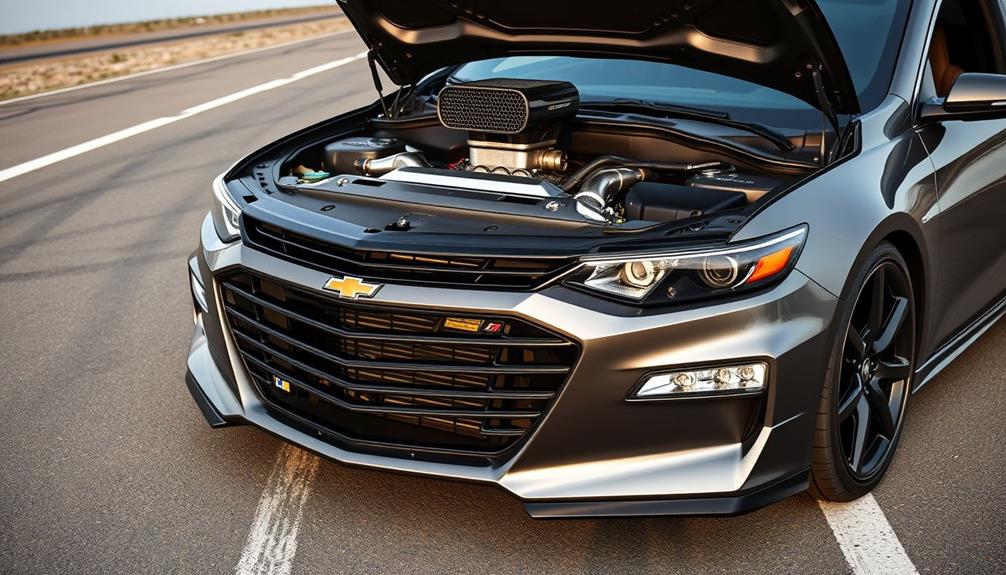
One of the best ways to elevate your Chevrolet Malibu's performance is by upgrading the intake and exhaust systems. By investing in a performance intake, you can enhance engine airflow, potentially increasing horsepower and torque by 5-10%.
Aftermarket intake systems, especially those designed for the 1.5L turbocharged engine, typically offer high-quality components and are priced around $159.95. These intake upgrades can greatly improve throttle response, giving you a more engaging driving experience.
While exhaust modifications can enhance sound, they're not as effective for performance gains since the stock exhaust is already optimized for efficiency. You'll find that these modifications primarily result in increased noise levels rather than considerable horsepower improvements.
It's essential to remember that any intake upgrades may lead to fault codes if not properly calibrated, highlighting the need for compatible tuning solutions.
To achieve the best performance enhancement, consider pairing your intake upgrades with appropriate tuning solutions that guarantee your Malibu runs smoothly.
With the right combination of intake and exhaust modifications, you'll reveal your sedan's true potential on the road.
Community Perspectives
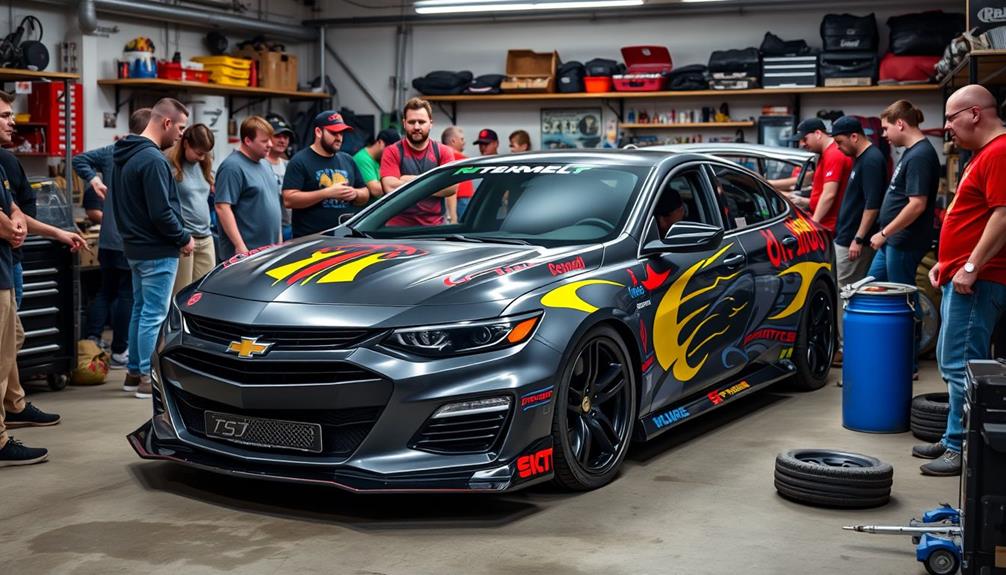
After exploring intake and exhaust upgrades, it's clear that community perspectives on tuning the Chevrolet Malibu vary widely. You'll find strong opinions on the practicality of engine swapping, with some enthusiasts enthusiastic about performance outcomes while others doubt feasibility.
Here are some key insights from the community:
- Technical Expertise: Many believe that achieving significant performance gains requires extensive technical knowledge, especially with challenges like ECM locking in modern Malibus.
- Modifications vs. Gains: There's a consensus that some performance tuning options yield minimal gains; often, modifications lead to more noise rather than substantial improvements.
- Visual Updates: Enthusiasts express a keen interest in visual enhancements alongside performance results, fervently sharing side-by-side comparisons from tuning projects.
- Community Engagement: Ongoing discussions highlight a desire for sharing progress and outcomes, showcasing how performance tuning is evolving in family sedans like the Malibu.
This engaging exchange illustrates the diverse experiences and expectations within the tuning community, reinforcing the notion that while tuning can be rewarding, it comes with its own set of challenges and considerations.
Historical Performance Insights

Historically, performance metrics for vehicles have evolved dramatically, particularly when comparing modern sedans like the Chevrolet Malibu to classic muscle cars.
Take the 2011 Malibu with its V6 engine, which boasts 252 horsepower and an impressive fuel efficiency of 27 MPG. In contrast, older muscle cars, while iconic, typically produced less horsepower and consumed more fuel. Additionally, the evolution of automotive technology has introduced innovative features such as advanced engine tuning options that can enhance performance, much like risk management strategies for Bitcoin IRAs can optimize investment returns.
Acceleration times tell a similar story. Muscle cars often took between 6 to 8 seconds to reach 60 mph, whereas modern vehicles benefit from lighter materials and advanced transmission systems that notably enhance their performance.
The advancements in automotive technology have led to better torque delivery and quicker gear shifts, allowing sedans to compete with the acceleration once reserved for sports cars.
When you consider performance enhancement options like tuning modules, you can push your Malibu even further. These tools optimize engine performance, making it possible to enjoy both power and efficiency.
As a result, modern vehicles consistently outperform their predecessors in every aspect, proving that today's sedans can be as thrilling as the revered muscle cars of the past. Embracing this evolution opens up a world of possibilities for your Malibu.
Frequently Asked Questions
How Do You Program a Chevy Malibu?
To program your Chevy Malibu, you'll need an OBD2 performance chip module. Identify your engine type, install the module using the Plug&Drive principle, and select your desired performance stage via a smartphone app for instant enhancements.
Is the Chevy Malibu LT Fast?
The Chevy Malibu LT isn't classified as fast compared to sportier models. With a 0-60 mph time of about 7.8 seconds, it's decent for daily driving but lacks the raw speed of performance vehicles.
What Is the Engine Power Reduction on a Chevy Malibu?
You might notice your Chevy Malibu's engine isn't quite the powerhouse you'd hope for. Power reduction can stem from tuning limitations and maintenance issues, so keeping up with regular service can enhance overall performance.
How Much Horsepower Does a Chevy Malibu Have?
You'll find that the horsepower of a Chevy Malibu ranges from 163 in the 1.5L turbo engine to 250 in the 2.0L variant, depending on the model year and engine choice you select.
Conclusion
So, are you ready to transform your Chevrolet Malibu into a performance powerhouse? With the right modifications—from engine swaps to tuning chips—you can release its true potential. Upgrading the intake and exhaust will not only boost horsepower but also give your ride that thrilling edge. Remember, every great journey starts with a single upgrade. Immerse yourself in the world of tuning, and watch your sedan turn heads on the road. Your Malibu's performance revolution awaits!
